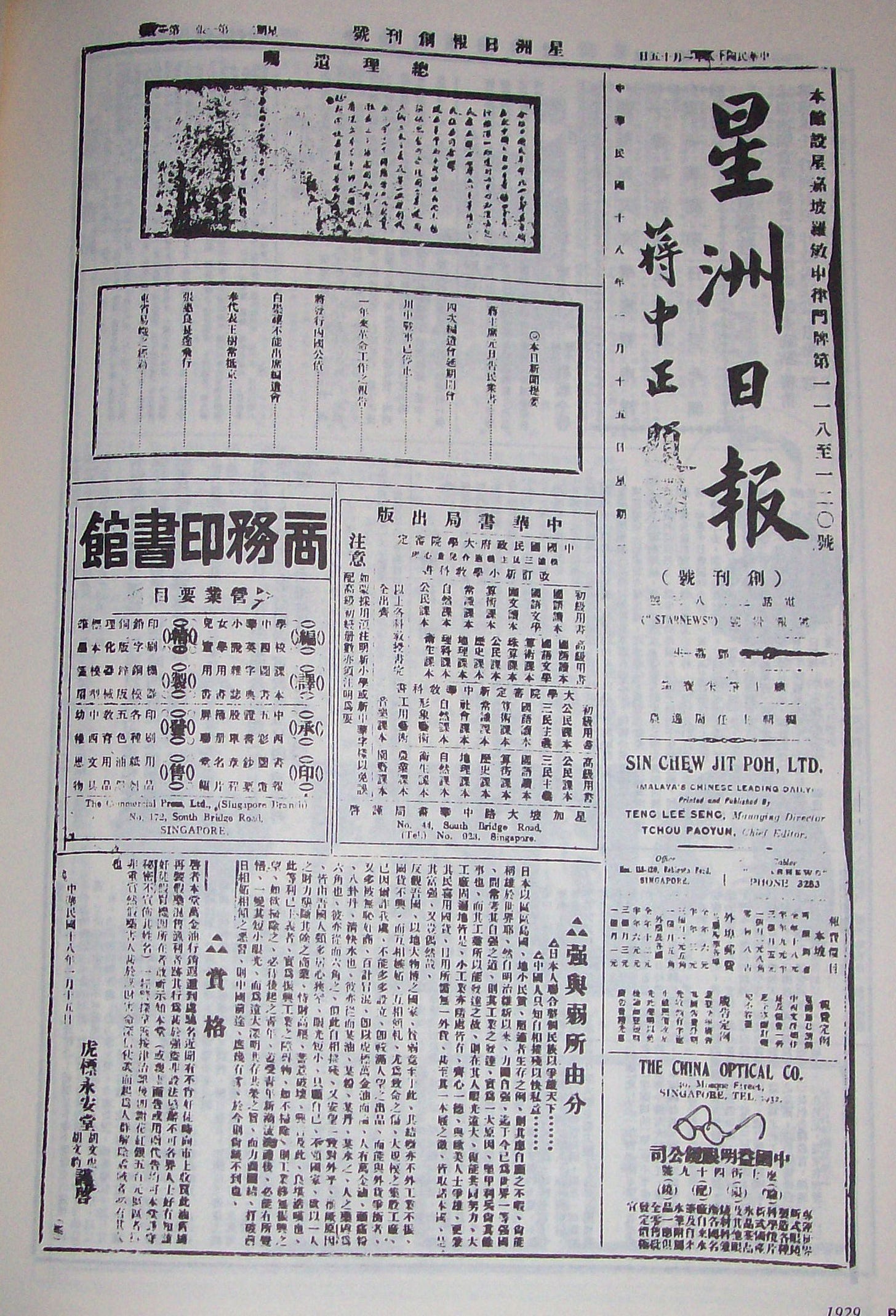Coding Ethics in Malaysia's Media
Benjamin YH Loh talks about partisanship, censorship, Chinese influence and other challenges facing the media industry in one of the world's most vibrant Chinese-language environments.
In addition to being one of the most diverse media landscapes in Southeast Asia, Malaysia is also one of the most vibrant markets for Chinese-language media in the world outside of China, Taiwan, and Hong Kong. But while the country’s vibrant civil society has continued to push against information restrictions in recent years, they remain subject to political pressure — including through a 1948 Sedition Act that rights organizations last year referred to as “archaic” as they called for its repeal.
One recent move by the Malaysian government that drew attention in media circles was the introduction of revisions to the Journalism Code of Ethics. To better understand these revisions and their implications for media in the country, Lingua Sinica spoke with Benjamin YH Loh, a senior lecturer at the School of Media and Communication and director of the Impact Lab at Taylor's University in Malaysia. We took the opportunity to get Loh’s views on the challenges facing the broader media environment in Malaysia, as well as Chinese-language media in the country.
To what extent, for example, is pressure from the Chinese government a factor impacting the health of Malaysian Chinese outlets? And to what extent is self-censorship at play?
Read on.
Lingua Sinica: In a recent article for The Diplomat, you talk about how to build public trust in the media in Malaysia, and look specifically at a recently revised Code of Ethics for the media and its impact. What are the key takeaways here?
Benjamin Loh: It’s the Malaysian government that has recently updated its Journalism Code of Ethics, a departure from the norm where such codes are typically developed by journalists themselves. While this code does not hold legal weight in Malaysia, it serves as the criteria for issuing government media passes, which are vital credentials for journalists seeking access to government events and parliament.
Originally established in the 1980s, the Code of Ethics was outdated, vague, and open to interpretation. The recent update aims to address contemporary challenges faced by the media industry. Notably, the revised code emphasizes the importance of naming sources, refraining from accepting gifts, and being mindful of conflicts of interest.
However, a notable concern with the updated code is its potential use to restrict media outlets critical of the government. This highlights a key issue surrounding the code's implementation. The rapid evolution of media in the digital age, particularly the challenges posed by social media, is not adequately addressed as the pressure to report news quickly in response to social media trends can compromise the quality and accuracy of journalism. The provision intended to address this specific issue is notably absent from the new code, which raises questions about its effectiveness.
LS: That’s interesting. What should we make of that, do you think?
BL: This discrepancy is puzzling, considering the government's focus on updating regulations. In Malaysia, traditional media, including print, broadcast, television, and radio, are heavily regulated under the Printing Presses and Publications Act 1984 (PPPA). This act mandates licensing for media outlets selling newspapers, magazines, or broadcasting content, granting the government significant control over traditional media.
The rapid evolution of media in the digital age . . . is not adequately addressed [in the new ethics code].
The stringent regulations empower the government to suspend licenses of media outlets that criticize or challenge governmental authority. This control has historically compelled traditional media to balance objectivity with caution, especially under authoritarian regimes.
The existing regulations, primarily rooted in the Sedition Act, influence media coverage and public discourse on sensitive topics like race, religion, and royalty. The Sedition Act has a significant legal framework, with the aim of restricting discussions on certain topics deemed sensitive, such as race, religion, and royalty.
LS: With such a broad framework, it seems the risk of overreach is pretty significant, right?
BL: Yes, the lack of clarity in defining these restrictions leads to cautious engagement by both individuals and the media. The broad scope of the Sedition Act contributes to uncertainty and self-censorship within the media landscape, highlighting the need for clearer guidelines and transparency in regulating media content and discussions on sensitive issues.
Sedition Acts typically punish individuals who question or challenge any authority, not just within the country but globally. While there is an unspoken understanding that these acts are not enforced for criticizing other nations, they are selectively applied, particularly in cases involving race, religion, and royalty. There are concerns about the favoritism shown towards certain groups, such as strong ethnic nationalist factions, who engage in attacks without sufficient preventive measures or limitations. This selective enforcement adds to the frustration of the public.
LS: Prime Minister Anwar Ibrahim came into office in 2022 with ambitious plans for reform. Was there any discussion of changes to the Sedition Act or other media-related legislation?
BL: Yes, the current Malaysian government, led by Ibrahim, promised to abolish the Sedition Act and replace it with a more progressive alternative. However, after nearly two years in power, there appears to be significant pushback and a lack of political will to fulfill this promise.
Sedition Acts are not unique to Malaysia, as many post-colonial independent countries have similar laws inherited from colonial rule.
Under the previous government, which had been in power for over 60 years, the media landscape was heavily regulated, with the government taking a punitive approach towards media outlets, especially online media, that it could not control. When the regime changed, the new government initiated plans to establish a self-regulating media council. The purpose of a media council is to allow the media to self-regulate in a way that insulates them from government influence. Ideally, a media council should comprise members from the media industry, civil society, and limited government representation to ensure a balance of perspectives and prevent undue influence.

The proposed media council is envisioned as a self-regulatory body for the media industry, aimed at maintaining high standards of journalism and providing a platform for the public to address concerns about media practices. The council would ideally comprise members from the media, civil society, and limited government representation to ensure balance and prevent undue influence.
The idea of establishing a media council was first proposed in 2018, and a committee was formed to deliberate on it. However, progress has been slow, with the government initially unwilling to move forward without more government and politically linked media representation on the council. This raised concerns about the council's independence and the government's influence over it.
Another issue that has stalled the process is the precarious financial state of Malaysian media, even among established outlets. The media council was seen as a potential means to bolster the industry's economic viability, but this raised questions about the council's funding and operations.
LS: As you alluded to earlier, it is odd to see a professional code of ethics for media coming from the government instead of, for example, an independent professional association. Could you explain for us the role and history of this Code of Ethics and why it was framed this way? And how might it impact the work of both Malaysian and foreign journalists?
BL: The original Journalism Code of Ethics in Malaysia was produced by the Malaysian Press Institute and the Newspapers Editor’s Association, working in conjunction with a specific ministry. This suggests that the original code was developed by journalists themselves, in collaboration with the government.
The updated code, however, raises concerns about the government's consultation process. According to members of local civil society organizations (CSO), the government announced the updated code on a Monday, after sending a brief to all CSOs the previous Friday, requesting feedback via email. This rushed and opaque process raises questions about the government's commitment to genuine stakeholder consultation.
The updated code affects both local and international journalists in Malaysia. For international journalists, the media pass is particularly crucial, as it not only grants access to various spaces but is also often required to maintain their visas in the country. The government has previously revoked media passes as a punitive measure, such as in the case of an Australian documentary team that reported on the government's treatment of migrant workers during the COVID-19 pandemic. The documentary highlighted alleged government abuses, leading to the revocation of the team's media passes and their subsequent deportation.
The rushed and opaque process [of the Code of Ethics] raises questions about the government's commitment to genuine stakeholder consultation.
This history underscores the potential for the updated code to be used as a tool for restricting press freedom and silencing critical reporting, particularly by international media outlets. The lack of transparency in the consultation process and the government's track record of using media passes to punish critical reporting raise concerns about the true intentions behind the updated code.

LS: We noticed right away that the code of ethics has vague language at many points, such as the need for journalists to “[realize] the role to contribute to nation building.” It is easy to imagine that being applied, for example, to attack critical news is seen as impacting public perceptions of the government. Do you believe that this new code has the potential to lead to increased government control over the journalistic space in Malaysia — or is it about something else?
BL: In Malaysia, the media landscape is notably segmented by language, with outlets operating in English, Malay, Chinese, and Tamil, each catering to distinct audiences. This linguistic diversity has sometimes led to ethnocentric reporting and differing perspectives on news and issues. The government's inclusion of guidelines addressing this in the Journalism Code of Ethics is a positive step, as it clarifies expectations for journalists and reduces the potential for arbitrary enforcement through laws like the Sedition Act.
Many media organizations have faced challenges in maintaining impartiality, often aligning with political interests. While state-owned media strive for objectivity, they can be constrained in their critique of government actions.
The updated code of ethics, while providing language to guide journalists, may not significantly alter the practical dynamics of media control. It serves more as a document that outlines expectations and standards. The government's ability to influence media behavior, particularly through the revocation of media passes for perceived transgressions, remains a potent tool for exerting control over journalistic practices.
LS: Shifting gears a bit, Malaysia is considered one of the most significant targets for media influence from the People’s Republic of China. Would you say this is primarily due to the historical relationship between Malaysia and China, or are there more nuanced factors at play?
BL: The Chinese language media space in Malaysia is remarkably vibrant and active, possibly the most active outside of China. This is partly due to the significant percentage of overseas Chinese who remain a minority in Malaysia, unlike in Singapore where they form a dominant force. As a result, the Chinese diaspora in Malaysia enjoys a considerable degree of political agency and influence.
Malaysia's unique cultural landscape, which includes a large Chinese community, attracts many Chinese tourists and students.
The Chinese state exerts its influence in Malaysia through indirect means, leveraging the local Chinese community and its various associations. These associations, often based on family ties, geographic origin, commerce, or specific professions, form a global "Guanxi" network that unites the Chinese diaspora in their engagement with China.
Rather than relying on Chinese state media, Chinese narratives are often presented through these associations. Notably, influential Chinese families with close ties to the Chinese state own a significant portion of local Chinese-language media in Malaysia. Media Chinese International, a dominant player, has close ties with the Chinese government and operates subsidiaries in Hong Kong, Europe, and previously in America.

In essence, the Chinese state achieves its goals in Malaysia by utilizing these networks and associations rather than relying on official state media. The Chinese state's influence in Malaysia is characterized by its close ties with influential Chinese families, who own a significant portion of local Chinese language media. This media empire is seen as an independent Chinese media hub, with subsidiaries operating globally.
Despite the large Chinese community in Malaysia, ethnic tensions are prevalent, and the Chinese state is mindful of the narratives it presents.
The Chinese community in Malaysia is generally sympathetic towards China, but there are exceptions on certain social issues.
LS: That’s an interesting point. Could you provide some examples?
BL: For instance, the Uyghur issue receives little attention from the Chinese community, as it does not have a direct impact on the country or economy. Instead, the Malay Muslim community is more likely to engage with the issue, seeing it as a means of fighting for their brethren.
The South China Sea issue is a highly contentious topic in Malaysia, with China's expansionist policies sparking tensions. While the Malaysian government has not been the most aggressive in pushing back against China, it is also not the most passive. Interestingly, despite the Chinese government's efforts to assert its claim to the South China Sea, many narratives and conversations in Malaysia, including those among academics, deliberately avoid discussing the topic.
This reluctance stems from the understanding that taking a sympathetic stance on the issue could have significant repercussions, particularly given the ethno-nationalist rhetoric that views Chinese and Indian communities in Malaysia as migrants who should return to their home countries. As a result, the South China Sea issue is a sensitive topic that is often avoided in Chinese media and community discussions.
LS : Could you elaborate on the dynamics behind China's growing media footprint in the country?
BL: In Malaysia, the influence of Chinese state media, such as Xinhua, the People’s Daily, and China Daily, is limited. Instead, private media groups, often family-owned like Media Chinese International and KTS Publishing Group, hold more sway. This is not unique to China, as private media tends to be more influential across the board.
Malaysia's history of authoritarian rule and the coexistence of state and private media have fostered a skeptical view of state media globally. Chinese media operating in Malaysia often refrain from direct engagement, recognizing the suspicion and wariness with which they are viewed.

Research has shown that private media outlets, such as Sin Chew Daily, have participated in media training sessions in Beijing. However, this is not seen in mainstream Malaysian newspapers. The invitation of Sinar Harian, a prominent Malay language media publisher critical of China's treatment of Uyghurs, to China is notable. Despite producing an article about the training, Sinar Harian continued to publish critical articles shortly after.
Local Malaysian media rarely conduct original reporting on issues related to China, especially on contentious issues like the Hong Kong protests. Chinese media in Malaysia, although independent, have shown shifts in their operation. Many Malaysian Chinese journalists who studied in Taiwan are sympathetic to the pro-Taiwanese independence movement, causing tension with the Chinese state.
The reluctance of Malaysian journalists to critically report on China is attributed to the country's strong economic partnership with China. The fear of fallout, such as China withdrawing investment or altering its interactions, contributes to the lack of critical engagement on Chinese issues, including Xinjiang and the Uyghurs. The only notable exception is Malaysiakini, which highlighted misinformation about the Hong Kong protests in the Chinese community and media.
LS: What impact does Malaysia's involvement in trolling farms potentially linked to pro-China entities have?
BL: Malaysia has played a significant role in political trolling, with indications of pro-China entities operating on behalf of the Chinese state. Since as early as 1999, Malaysia has been involved in cyber troopers and similar activities, leveraging the unregulated internet to engage in inauthentic political trolling. While the United States faced challenges in the 2016 elections, Malaysia has been grappling with this issue since the early 2000s.
Recognizing the costliness of such activities, Malaysian politicians have strategically crafted and disseminated political messaging through various channels, collaborating with analysts and commentators to reach the public through diverse means. This sophisticated approach, funded in part by Chinese sources, has been instrumental in shaping narratives within Malaysia.
Notably, a Chinese party member proposed to China the financing of troll farms in Malaysia, staffed by individuals, including Chinese students, with a focus on influencing not only Malaysia but also conducting information operations in Taiwan and Hong Kong. Reports from Taiwan have identified Malaysia as a base for a significant troll farm impacting political spaces in Taiwan and Hong Kong, with allegations of misinformation campaigns in the region.
Despite changes in political leadership, these troll farms continue to operate, underscoring the indirect influence of the Chinese state through these inauthentic political actors in shaping digital political landscapes in Malaysia and beyond.
LS: At the beginning of our interview you mention the precarious financial state of Malaysian media. How would you assess the economic status of Chinese language media in Malaysia?
BL: Media Chinese International Limited (MCIL) is owned by the Tiong family, who have made their fortune in the lucrative timber industry, particularly in Sarawak, Malaysia. This financial backing from the timber industry has kept the Chinese media space safe from the economic concerns that plague other media outlets.
The strong ownership and comfortable financial position of the Tiong family allowed the Chinese media space to maintain its independence. However, there are rumors of a potential shift in leadership as the original chairman ages and passes the reins to his children. There have been whispers that the younger generation may not be interested in continuing the media business, which could lead to a divestment of their stake.
While the situation is unclear, it suggests that there may be changes on the horizon for the Chinese media landscape in Malaysia.






Thanks for this piece. As a Malaysian journalist abroad, I still keep abreast of the Malaysian journalism landscape. I may be partial, but I value the work done by the Chinese language media in Malaysia immensely. They could be quite generous with sharing sources and information (since our audiences don't overlap all that much), especially in under-reported areas (at that time) such as health and education. Over five years ago, a small survey by the Institute of Journalists Malaysia found that they are the most underpaid group of media works (compared to journalists working in English or Malay outlets), and that was shocking to me!
https://www.malaymail.com/news/malaysia/2018/10/05/survey-local-english-media-female-journalists-take-home-the-most-pay/1679793